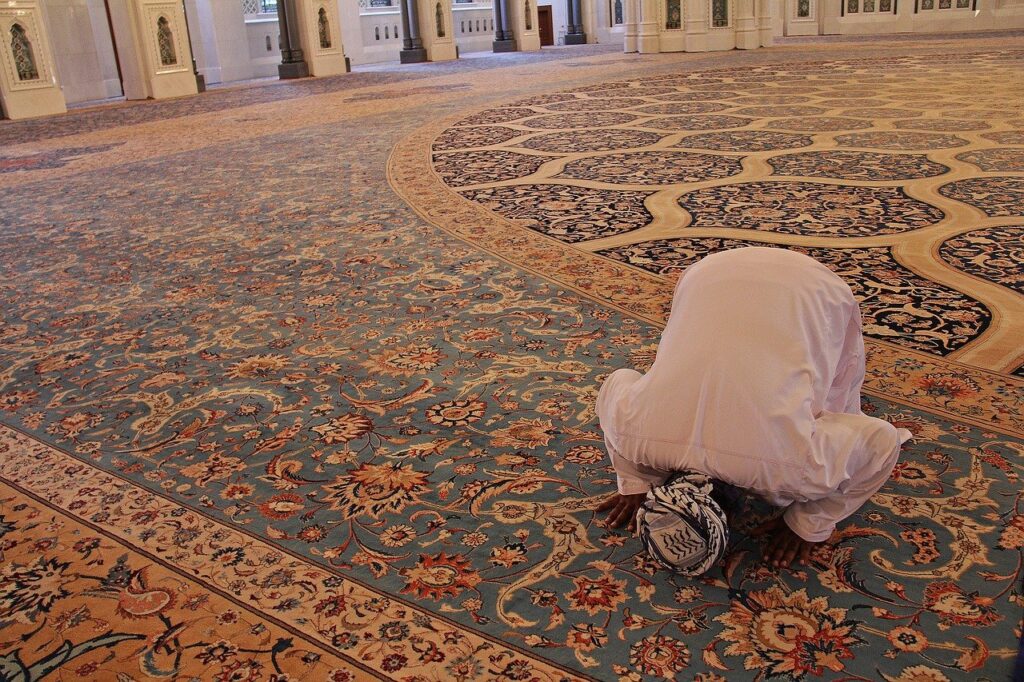Dua When Sitting Between Two Sujood (Prostrations) In Arabic -1
رَبِّ اغْفِرْ لِي رَبِّ اغْفِرْ لِي
Dua When Sitting Between Two Sujood (Prostrations) In English Transcription-1
Rabbighfir lee, Rabbighfir lee
Dua When Sitting Between Two Sujood (Prostrations) In English-1
Lord, forgive me. My Lord, forgive me.
An-Nasa’i: 1146, 1666 Abu Dawud: 874
Dua When Sitting Between Two Sujood (Prostrations) In Arabic-2
اللَّهُمَّ اغْفِرْ لِي، وَارْحَمْنِي، وَاهْدِنِي، وَاجْبُرْنِي، وَعَافِنِي، وَارْزُقْنِي، وَارْفَعْنِي
Dua When Sitting Between Two Sujood (Prostrations) In English Transcription-2
Allaahum-maghfir lee, warhamnee, wahdinee, wajburnee, wa ‘aafinee, warzuqnee, warfa’nee
Dua When Sitting Between Two Sujood (Prostrations) InEnglish
O Allah forgive me, have mercy on me, guide me, support me, protect me, provide for me and elevate me.
Ibn Majah: 3845, 1517 At-Tirmidhi: 284

Question
asalamu alikum is this according to the obligations (wajibat) of salah (if so, then what is the proof) (should we give sajda sahw if we miss it) saying “Rabb ighfir li (Lord forgive me)” between both prostrations
Reply
Perfect praise to Allah, the Lord of the worlds. I testify that there is no other worthy worship than Allah and that Muhammad sallallaahu `alayhi wa sallam (may Allah extol his mention) be his slave and his messenger.
According to the opinion of the majority of scholars, Allah has mercy on them. The word of the person who prays ‘Rabi Aghfir li’ between the two prostrations is desirable and not an obligation of the obligations of prayer, because the Prophet Sallallahuahayhi wa sallam (may Allah exalt his mention) did not order the person who did not know how to pray to say it. However, the Hanbali School of Jurisprudence is of the opinion that it is a waajib (obligation).
The encyclopedia of Fiqh (Islamic jurisprudence) reads as follows:
“As for the seat between the two prostrations, it is a sunnah to ask forgiveness [ie. “Rabi Aghfir li”] according to the schools of jurisprudence Hanafi, Maaliki and Shaafi’i, it is also a story of Ahmad. The proof is that Huthayfah, may Allah be pleased with him, prayed with the Prophet sallallaahu `alayhi wa sallam (may Allah extol his mention) and that he [i.e. the prophet] said between the two prostrations: “Rabi Aghfir li, Rabi Aghfir li”. Nevertheless, it is not an obligation to ask forgiveness [i.e. “Rabi Aghfir li”] because the Prophet sallallahuah’alayhi wa sallam (may Allah extol his mention) did not teach anyone who could not pray to say it. However, Hanbali School’s known view is that it is a Waajib (obligation), and this is Is-Haaq and Daawood’s point of view. “
The evidence provided by Hanbali School that it is an obligation is that it was confirmed by the Prophet sallallaahu `alayhi wa sallam (may Allah extol his mention) saying,” Pray as you see me pray “. According to them. if he is deliberately left, his prayer becomes obsolete, and if he is left out of oblivion, he must prostrate himself for oblivion.
Al-Mughni, written by Ibn Qudaamah, may Allaah have mercy on him, saying, “If one forgets one of the obligatory mentions [Ath-kaar], like Tasbeeh in the reverse position [Rukoo ‘] and to prostration [Sujood] and saying “Rabi Aghfir li” between the two prostrations and the sentence of “Rabana walaka Al-hamd”, he should not return to it once he has left the position where he should say; he should rather continue [his prayer] and prostrate himself for oblivion because he left it, by analogy with Tashahhud “.
In our opinion, the prevailing opinion is that of the majority of scholars, the Prophet sallallahuahu `alayhi wa sallam (may Allah extol his mention) mentioned to him who did not know how to pray what he should do and say of so that his prayer is valid and he says to him: “The prayer of one of you is complete only when he ……” and he did not tell him to ask for forgiveness [that is to say say ‘Rabi Aghfir li’] between the two prostrations, and he did. do not mention the Tasbeeh in a reverence and prostration position, because if it had been an obligation [Waajib], he would have clarified it. It is rather a recommended sunna (prophetic tradition), confirming that the Prophet sallallaahu `alayhi wa sallam (may Allah extol his mention) did so.
Allah knows best.



